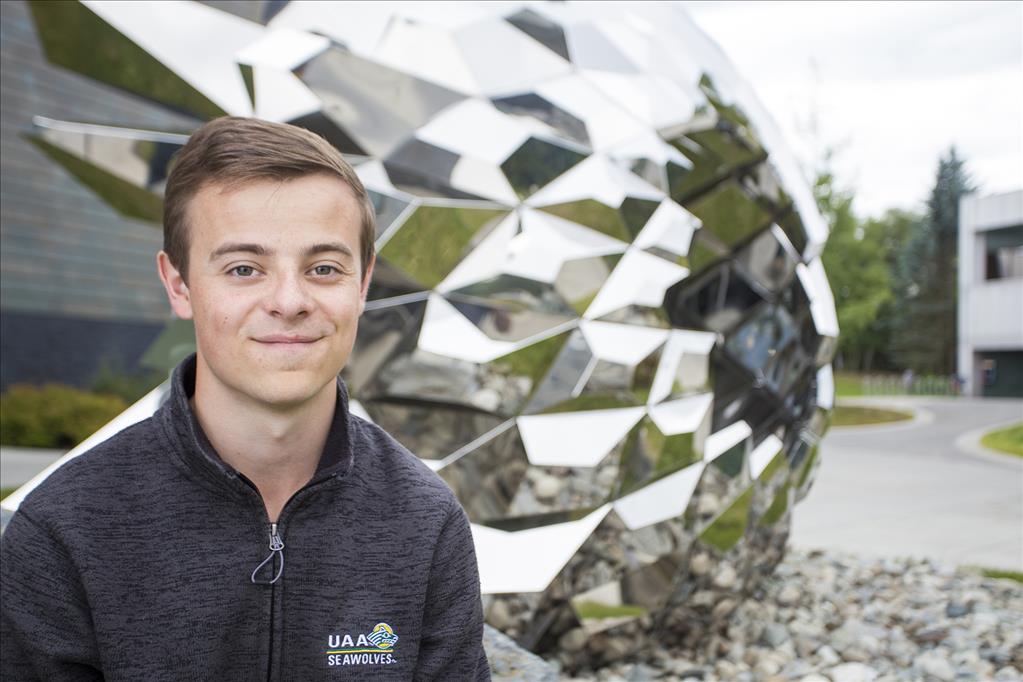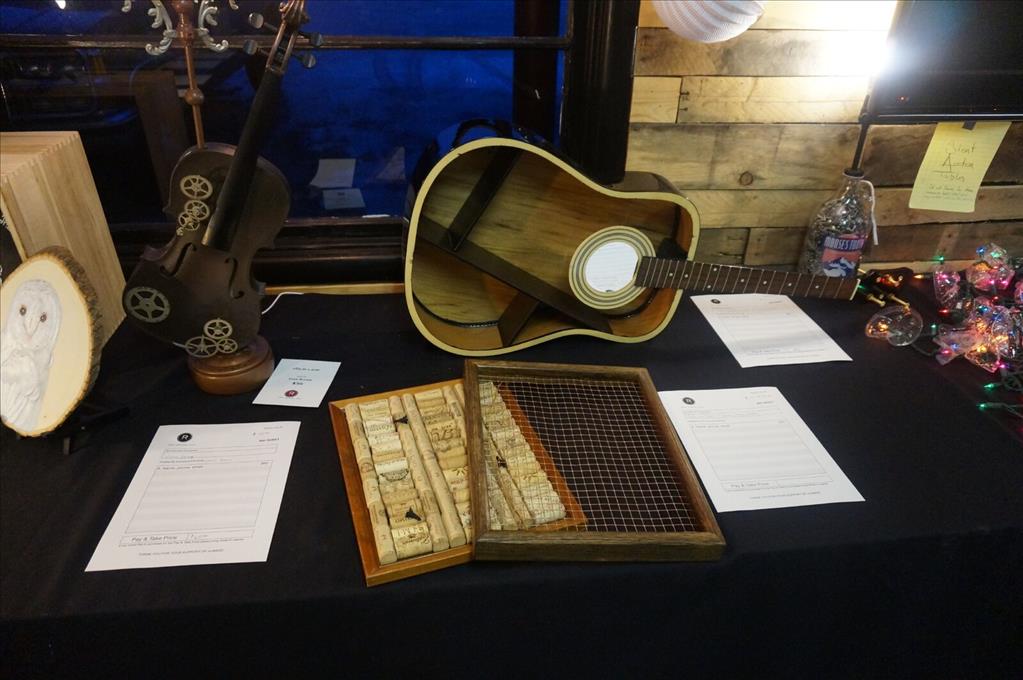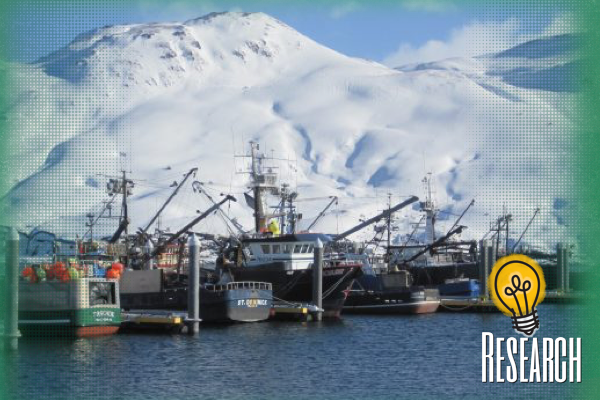English internship helps UAA student grow inclusive parks in Anchorage
by Tracy Kalytiak |

A child plays at an inclusive playground Anchorage Park Foundation helped create at Kincaid Park. (Photo courtesy of Anchorage Park Foundation)
The words "English major" once conjured images of strident intellectuals arguing about deconstruction and other literary theories, or mousy academics in hushed libraries, heads bent over leather-bound books clasping pages of Shakespeare, Melville, Austen, the Bröntes.
At UAA, however, English majors engage with people outside campus and connect with internships that help them earn work experience while making a meaningful impact on the lives, health and happiness of people in their community.

Beth Nordlund, executive director of Anchorage Park Foundation, worked with UAA English intern (and spring 2017 graduate) Deborah Castillo. Castillo helped APF earn $100,000 in grant money it will use to grow its network of inclusive parks. (Photo by Philip Hall / University of Alaska Anchorage)
"I love literature," said UAA English student Deborah Castillo, who just completed an undergraduate professional writing internship and graduates this month. "I love words, analysis, research. I had Dr. [Heather] Adams in spring 2016 for rhetoric and composition, and she emailed me last semester about internships ... She sent me to Anchorage Park Foundation."
Castillo took the lead on research and revisions on a grant application that earned the Foundation a $100,000 grant to enhance its network of "inclusive" playgrounds - facilities specially designed to engage children experiencing physical and emotional challenges. And, Castillo also assisted the Foundation on a project focused on helping people access and use Anchorage's web of trails to get healthier.
Research and writing were skills Castillo had honed in her classes and enjoyed: "I like being able to sit at a computer, I like putting pieces together, looking for a good outcome."
Her internship, however, required more. She couldn't write effective grant requests unless she learned how to grow a net of relationships.
"I'm a very introverted person," Castillo said. "There's a lot of collaborative work. When I first got the internship, I thought a supervisor would just give me work; I thought it would be more independent. I didn't realize how much communication is involved with grant research."
Making play possible
Anchorage Park Foundation is not an organ of the Municipality of Anchorage; it is an independent nonprofit that works closely with Anchorage Parks and Recreation Department to upgrade parks and tailor them to the needs of the people who live nearby.

Kiwanis Fish Creek Park provides a safe place to play for people who have physical or emotional disabilities. (Photo courtesy of Anchorage Park Foundation)
Inclusive parks are spaces where children and adults of all abilities can play together in a safe environment.
Why is it so important to provide playgrounds, especially to people who experience physical or emotional challenges? Because play is essential to a child's development, crucial in shaping his or her identity and integral to physical, cognitive, emotional and linguistic development.
APF has, within the past four years, installed the following 10 inclusive playgrounds in Anchorage: Balto Seppala, Barbara Street, Campbell Creek, Cuddy Family Midtown, Dave Rose, David Green, Duldida, Kincaid, Kiwanis Fish Creek and Suzan Nightingale McKay parks.
The Foundation is installing inclusive playgrounds in South Anchorage Sports Park, Muldoon Town Square, and Jewel Lake. Plans are in the works to create inclusive playgrounds at Chugach Foothills, Frontierland, and Ruth Arcand parks, as well as Anchorage's first indoor playground in the Fairview Recreation Center.
"Rasmuson Foundation is our biggest funder," Nordlund said.
'Being able to help is amazing'
Professor Adams coordinates UAA's English department internship program, a field-oriented program that is open to all English majors and minors and other students eligible or interested in taking a 400- or 600-level English course. The program has space for 10 undergraduates to participate each semester (fall, spring and summer) in on- or off-campus placements.
The program enables students to learn hands-on professional writing and other skills while making community connections and earning upper-division or graduate course credit.
"We don't meet physically as a class so that students' emphasis can remain on their on-site work with a community partner," Adams wrote.
Students complete reflective writing throughout the semester and compile an e-Portfolio at the end of the semester: "This writing helps them consider what they are learning through the internship," Adams wrote.
The professor said most students think the benefit of the internship relates to the writing they're doing for a community partner. "But really, there are numerous benefits," she wrote. "Students can use the internship to practice transitioning from the highly regulated college classroom to the less-regulated professional setting. Interns practice time management, self-directed learning, and problem solving on the job. Additionally, the program is a great way for students to develop connections and begin to cultivate a professional network in the community."

Kiwanis Fish Creek Park offers visitors a place where people who have physical or emotional disabilities can safely play. (Photo courtesy of Anchorage Park Foundation)
Recent placements have included, in addition to APF, the Anchorage Running Club, Anchorage Senior Activity Center, Talking Anchorage, UAA Center for Community Engagement and Learning, UAA Creative Writing Low Residency Program, UAA Honors College, UAA Information Literacy Community of Practice, UAA Office of Financial Aid, and Understory Creative and Scholarly Undergraduate Journal.
Adams' contact at Anchorage Park Foundation was its executive director, Beth Nordlund.
"Grant writing is kind of a science, kind of an art," Nordlund said. "Research is something Anchorage Park Foundation and many nonprofits have limited time to accomplish because there are so many things out there in the world to take a look at."
Castillo spent three mornings a week, for nine weeks, at APF, Nordlund said.
"She learned all about the kind of work we do and learned about the projects we wanted to seek money to accomplish," Nordlund explained. "She wrote letters of interest every week - oftentimes you need to do that before you can submit an application. She also helped do research to decide which grants to apply for and did a couple of grants."
Nordlund said Castillo connected with the Diabetes Association to work on the idea of having wellness routes: "So we can identify segments of trail that would be a nice loop or an easy way to get into fitness," Nordlund said. "There seems to be a pretty good community demand for that."
Sixty percent of Anchorage residents want to use its trails more.
"If we can identify barriers and address them, we can make a difference in our health and obesity rates," Nordlund said. "There are 250 miles of maintained trail in Anchorage. Sometimes you have to be in the know to really know where to start and how to navigate the system."
Nordlund says APF is working on a program called Prescription Trails.
"It's going to involve creating wellness routes, and physicians prescribing regular trail use as part of a health lifestyle," she said. "Anchorage is ideally suited with its beautiful network of trails, but we need signs, maps and education."

A child plays at an inclusive playground in Duldida Park. (Photo courtesy of Anchorage Park Foundation)
Nordlund says APF will launch two years' of work at Jewel Lake Park this summer, using money Castillo helped raise.
"We are going to replace the playground, which is now a wooden rustic boat," she said. "I anticipate there will be a zipline and a playground."
Castillo's work helped APF learn about the people living in the areas each park serves.
"I'm an avid park user but never thought about behind the scenes, the work it takes, how it reaches the community - things as simple as enjoying a lunch break in a park," Castillo said. "I learned how many people in a zip code live with disabilities, their ethnic backgrounds, languages they speak. It becomes very real when you see the numbers, maps and graphs and then try to frame a narrative around the analyses. It opened my mind to the work that's done."
Interested in learning more about the UAA Internship in Professional Writing? Contact Heather Adams, hbadams@alaska.edu, or Trish Jenkins, pmjenkins@alaska.edu.
Written by Tracy Kalytiak, University of Alaska Anchorage
 "English internship helps UAA student grow inclusive parks in Anchorage" is licensed under a Creative Commons Attribution-NonCommercial 4.0 International License.
"English internship helps UAA student grow inclusive parks in Anchorage" is licensed under a Creative Commons Attribution-NonCommercial 4.0 International License.














